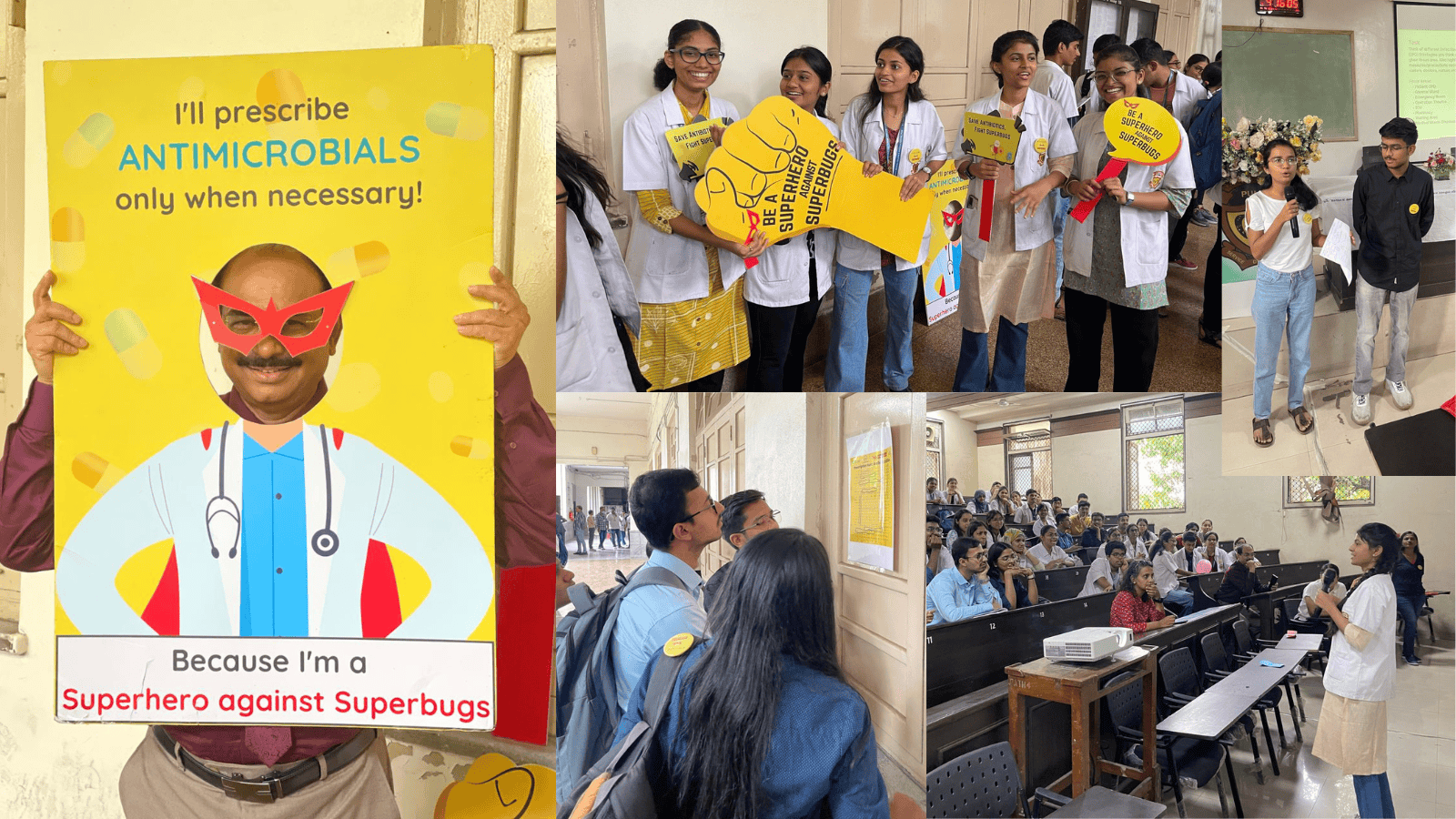Continuing the series of AMR Frontline Workshops for Medical Students as part of the ongoing outreach efforts under the Alliance for Pathogen Surveillance Initiative (APSI) India—a project funded by The Rockefeller Foundation—the Superheroes against Superbugs (SaS) team collaborated with APSI-India Pune Cluster and Pune Knowledge Cluster (PKC) to deliver another impactful workshop at BJ Government Medical College, Pune, on June 9, 2024.
The SaS flagship frontline workshops are designed to equip the next generation of healthcare professionals with the knowledge and skills necessary to combat the emerging public health threat of Antimicrobial Resistance (AMR). These workshops aim to ignite curiosity and emphasize the urgency of addressing the challenges associated with AMR in clinical settings through knowledge dissemination. Utilizing interactive learning strategies ensures that students find the workshops engaging and feel empowered rather than overwhelmed by the content.
Workshop Overview
Over 75 enthusiastic students participated in this dynamic workshop, which featured a variety of interactive games, activities, expert talks, and competitions. The main objective of the workshop was to familiarize participants with key aspects of AMR pertinent to their profession, including its causes, understanding the clinical challenges it presents, and discussing effective strategies for mitigation. The workshop also gave a strong call to action, inviting the participants to take charge and contribute to the fight against AMR in their individual capacities.
Sessions and Activities
The workshop began with introductions by SaS Co-founder and Co-lead, Dr. Ponnari Gottipati. She provided the workshop’s context by introducing SaS, explaining its motivation for engaging with medical students, and outlining what participants could anticipate from the session. The introductions were followed by a short presentation given by the co-organizer PKC, represented by Ms. Poornima Sangewar, Assistant Program Manager, who highlighted the key initiatives taken by PKC in solving city problems through knowledge and technology interventions.
To break the ice between the workshop facilitators and participants and energize the audience for the forthcoming sessions, the SaS team engaged the students in a spirited game of “TABOO: AMR Edition.”
The first session of the workshop was led by Dr. Shraddha Karve (Research Faculty Fellow, Ashoka University), which set the context for the entire workshop by elucidating the concept of Antimicrobial Resistance. Dr. Karve further elaborated on the focus areas of APSI, which include clinical and environmental surveillance for AMR. She used a popular movie reference to emphasize the urgent need to act against AMR, stating, “Now is the time to stop running from infection-causing agents and start running after AMR.”
The next session was an informational lecture by Dr. Rajesh Karyakarte (Professor and HoD, Department of Microbiology, BJGMC), titled “Safe Zones and Watchful Eyes: The Role of Infection Control and Antimicrobial Stewardship in Tackling AMR.” Dr. Karyakarte discussed the role of infection prevention and control in reducing the burden of AMR. Providing a historical overview of the emergence of AMR infections in clinical settings, he highlighted the significance of responsible use of antimicrobials by doctors and patients alike.
The second segment of the workshop began after lunch with a presentation by Dr. Aarti Kinikar (Professor and HoD, Department of Pediatrics, BJGMC), providing a comprehensive overview of the challenges posed by AMR in clinical settings, specifically in the Pediatrics Department. Here the focus shifted from preventing AMR to curing AMR infections by using antibiotics rationally. Dr. Kinikar captivated the students in an interactive case-based discussion where they decoded the process of providing patient-specific treatment while making effective use of antibiotic de-escalation therapy.
Mr. Sachin Dubey (CEO, Module Innovations) delivered a guest lecture, “AMRpreneurs: Developing Diagnostic Tools for AMR.” He highlighted the challenges and opportunities in biomedical entrepreneurship while reflecting on his own experience of founding Module Innovations. Mr. Dubey talked about their patented products USENSe (a low-cost UTI diagnostic kit) and ASTSENSe (a quick phenotypic test to detect Antimicrobial Susceptibility).
Bringing the focus back to infection prevention, we conducted a group activity called Pathogen Patrol, which was facilitated by Dr. Sushma Pednekar (Department of Microbiology, BJGMC). Through this activity, we encouraged students to participate in unmoderated group discussions with their peers and devise strategic plans to implement standard Infection Prevention & Control Practices within the identified focus areas in a hospital.
To conclude the workshop and examine the learnings of our participants, we organised a two-level fun Jeopardy-style quiz competition. Level one was a fast-paced quiz. Qualifiers from level one were divided into four groups. The teams then competed against each other in an interactive Jeopardy-style quiz on AMR.
Despite the logistical challenges faced on the day of the workshop due to the monsoon season, the interactive activities and discussions sparked a genuine interest in AMR and equipped the students with practical knowledge and strategies to tackle this pressing issue.
The AMR Frontline Workshop at BJ Government Medical College, Pune, is another step in empowering medical students to take an active role in the fight against AMR. Through a blend of expert talks, interactive activities, and practical exercises, the workshop provided a comprehensive and engaging learning experience. The students showed enthusiastic participation, contributing to lively discussions throughout each session. The participants appreciated the interactive format and the opportunity to engage directly with experts in the field.
